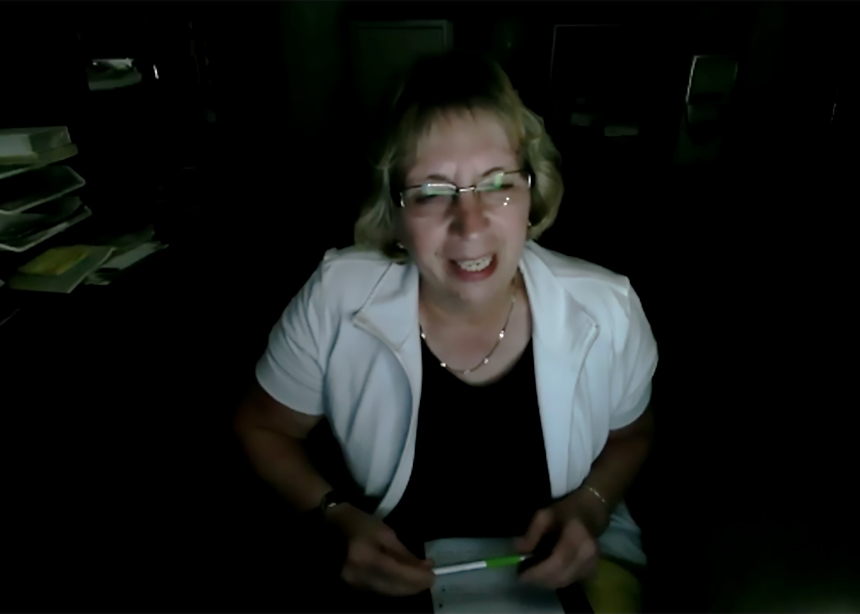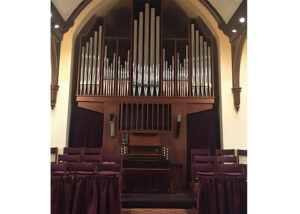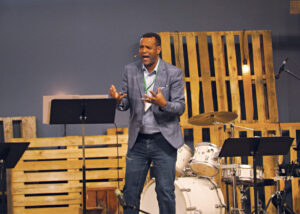“We have to embrace the disequilibrium we feel right now and let it teach us what it needs to teach us,” said Claire Ewert Fisher, interim pastor of Rosthern Mennonite Church, speaking at Mennonite Church Saskatchewan’s virtual town hall event, “Dreaming church beyond pandemic.”
The gathering, held via Zoom on June 16, involved pastors and lay people reflecting on what the COVID-19 pandemic has been like for them so far, and imagining where God’s Spirit might be leading the church in the future.
Interim church engagement minister Josh Wallace facilitated the conversation at the invitation of the regional church’s Ministries Commission. John 21:4-14 provided a scriptural framework for the discussion that followed. Participants offered these observations of the biblical text:
- Jesus tells the disciples to fish on the other side of the boat.
- Jesus gives what he already has.
- Jesus provides abundance where there is scarcity.
Then participants discussed what life in the pandemic has been like for them and for their churches. Some spoke of exhaustion and stress.
“We’re still functioning, but not at optimal [levels],” said Kevin Koop of Carrot River Mennonite.
Ryan Siemens, MC Saskatchewan’s executive minister, confessed to having mixed emotions. “Early on, home life was lovely,” he said. “Now we’d like someone to take the kids.” Parents of young children are finding the experience stressful, he said.
Others have found value in their experiences. Nancy Epp of Rosthern Mennonite said daily phone calls with her elderly father have helped her to be more patient and understanding in other areas of her life.
Sharon Schultz of Eyebrow Mennonite appreciates the connections she has been able to make with people in her community who don’t normally attend church.
And Eileen Klassen Hamm of Wildwood Mennonite values being able to access worship services from across MC Canada. “There’s something really beautiful about it,” she said. “We’re not captured by geography like we would be normally.”
What the future might hold
Two scenarios helped guide participants’ discussion as they looked forward.
In the first scenario, Ewert Fisher theorized that the church will be motivated by the drive to be together. “We will likely need to form new social groupings,” she suggested. “We will need to become part of urban-farming operations, as food shortages and higher prices are waiting for us.” And she asked, “Will we fall back into patterns developed by the colonial era?”
“We find ourselves in time of living tentatively,” she said. “What does this mean for our economy, for education, for treaty rights? Is predictability a thing of the past?
The second scenario, presented by Siemens, posited that the church will be motivated by the need to put safety first. In this scenario, “we need to socially isolate ourselves, sacrificing other aspects of health for the safety of biological health,” he said, adding that in this scenario “there is a growing class and cultural divide between the privileged and those who must work or whose culture doesn’t allow them to distance.”
He asked, “How does [putting] safety first shape this generation? How does this affect the elderly, those served by Circles of Support and Accountability? How do we measure risk when safety becomes our main concern?”
Some participants indicated both scenarios are being played out in their congregations already, as indicated by conversations around re-opening church.
“Some are ready and some are frightened,” said Rachel Wallace of Eigenheim Mennonite. “I’m not ready for this new division. I feel tired trying to hold this tension.”
Koop suggested that Ewert Fisher’s scenario presented a false dichotomy between the inner life of the church and the outer life of the church’s interactions with the world. “Our inner life of church needs to include our outer life with our neighbours, he said. “All the barriers we set up to run our lives efficiently have come down. We need to reclaim a theology of parish.”
Similarly, Schultz identified the way forward as being “beyond our church walls,” adding, though, that “there are people who are afraid. They will open up now in a way that they wouldn’t before. We’re being given a window that could be really transformational. We’re being invited to walk out into our communities as people of hope.”
Garth Ewert Fisher of Mount Royal Mennonite in Saskatoon agreed with Schultz. “The quality of hope that the church can offer the world will be important going forward,” he said. “We are socialized for scarcity. If I have fear, I will be socialized even more that way. What is the quality of hope in the model of life that the church offers?”
“I may be too optimistic,” said Florence Driedger of Regina’s Peace Mennonite, “but I think the pandemic gives us huge opportunities to live our faith in every aspect of our lives.”
Do you have a story idea about Mennonites in Saskatchewan? Send it to Donna Schulz at sk@canadianmennonite.org.









Leave a Reply
You must be logged in to post a comment.